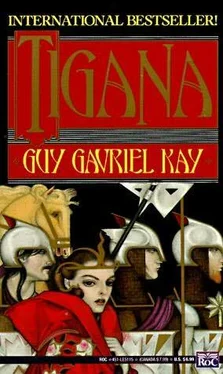Guy Kay - Tigana
Здесь есть возможность читать онлайн «Guy Kay - Tigana» — ознакомительный отрывок электронной книги совершенно бесплатно, а после прочтения отрывка купить полную версию. В некоторых случаях можно слушать аудио, скачать через торрент в формате fb2 и присутствует краткое содержание. Год выпуска: 1990, Жанр: Фэнтези, на английском языке. Описание произведения, (предисловие) а так же отзывы посетителей доступны на портале библиотеки ЛибКат.
- Название:Tigana
- Автор:
- Жанр:
- Год:1990
- ISBN:нет данных
- Рейтинг книги:4 / 5. Голосов: 1
-
Избранное:Добавить в избранное
- Отзывы:
-
Ваша оценка:
- 80
- 1
- 2
- 3
- 4
- 5
Tigana: краткое содержание, описание и аннотация
Предлагаем к чтению аннотацию, описание, краткое содержание или предисловие (зависит от того, что написал сам автор книги «Tigana»). Если вы не нашли необходимую информацию о книге — напишите в комментариях, мы постараемся отыскать её.
Tigana — читать онлайн ознакомительный отрывок
Ниже представлен текст книги, разбитый по страницам. Система сохранения места последней прочитанной страницы, позволяет с удобством читать онлайн бесплатно книгу «Tigana», без необходимости каждый раз заново искать на чём Вы остановились. Поставьте закладку, и сможете в любой момент перейти на страницу, на которой закончили чтение.
Интервал:
Закладка:
So over the years she had become adroit at avoiding situations where she might find herself alone with the Fool; his guileless eyes, unnervingly similar to Brandin's, gave her genuine trouble. They seemed, if she looked into them for too long, to have no depth, to be only a surface, reflecting her image back to her in a fashion very different from that of the gold-plated mirrors, and at such times she did not like what she was made to see.
From the doorway, with the polished grace of long experience, Solores drifted to her right as Dianora moved left, smiling at people she knew. Nesaia and Chylmoene, chestnut, and amber-tressed, crossed the floor together, creating a palpable stir where they passed.
Dianora saw the poet Doarde standing with his wife and daughter. The girl, about seventeen, was obviously excited. Her first formal reception, Dianora guessed. Doarde smiled unctuously across the room at her, and bowed elaborately. Even at a distance, though, she could read the discomfiture in his eyes: a reception on this scale for a musician from Ygrath had to be bitter gall for the most senior poet in the colony. All winter he had preened with pride over his verses that Brandin had sent east as a goad for the Barbadian when word had come in the fall of the death of Sandre d'Astibar. Doarde had been insufferable for months. Today though, Dianora could sympathize with him a little, even though he was a monumental fraud in her view.
She'd told Brandin as much once, only to learn that he found the poet's pompousness amusing. For genuine art, he'd murmured, he looked elsewhere.
And you destroyed it, she'd wanted to say.
Wanted so much to say. Remembering with an almost physical pain the broken head and sundered torso of her father's last Adaon on the steps of the Palace by the Sea. The one for which her brother, finally old enough, had served as model for the young god. She remembered looking dry-eyed at the wreckage of that sculpted form, wanting to weep and not knowing where her tears were anymore.
She glanced back at Doarde's daughter, at her young, scarcely contained exhilaration. Seventeen.
Just after her own seventeenth naming day she had stolen half of the silver from her father's hidden strongbox, begging pardon of his spirit and her mother's blessing in her heart, and asking the compassion of Eanna who saw all beneath the shining of her lights.
She'd gone without saying good-bye, though she had looked in a last time by carried candlelight, upon the thin, worn figure of her mother, uneasily asleep in the wideness of her bed. Dianora was hardened, as for battle; she did not weep.
Four days later she'd crossed the border into Certando, having forded the river at a lonely place north of Avalle. She'd had to be careful getting there, Ygrathen soldiers were still ranging the countryside and in Avalle itself they were hammering at the towers, bringing them down. Some yet stood, she could see them from her crossing-place, but most were rubble by then, and what she saw of Avalle was through a screen of smoke.
It wasn't even Avalle by then, either. The spell had been laid down. Brandin's magic. The city where the pall of smoke and summer dust hung so heavily was now called Stevanien. Dianora could remember not being able to understand how a man could name the ugly wreckage of a place once so fair after a child he had loved. Later that would become clearer to her: the name had nothing to do with Brandin's memory of Stevan. It was solely for those living there, and elsewhere in what had been Tigana: a constant, inescapable reminder of whose death had meant their ruin. The Tiganese now lived in a province named Lower Corte, and Corte had been their bitterest foe for centuries. The city of Tigana was the city of Lower Corte now.
And Avalle of the Towers was Stevanien. The vengeance of the King of Ygrath went deeper than occupation and burning and rubble and death. It encompassed names and memory, the fabric of identity; it was a subtle thing, and merciless.
There were a number of refugees in the summer Dianora went east, but none had anything remotely resembling her own fixed purpose and so most of them went much further away: to the far side of the Certandan grainlands, to Ferraut, Tregea, Astibar itself. Willing, anxious even, to live under the spreading tyranny of the Barbadian lord in order to put as much distance as they could between themselves and their images of what Brandin of Ygrath had done to their home.
But Dianora was clinging to those images, she was nursing them within her breast, feeding them with hate, shaping hatred with memory. Twin snakes inside her.
She only went a handful of miles across the border into Certando. The late-summer fields of corn had been yellow and tall, she remembered, but all the men were gone, away to the north and east where Alberico of Barbadior, having carefully consolidated his conquests of Ferraut and Astibar, was now moving south.
He was master of Certando by the end of the fall, and had taken Borifort in Tregea, the last major stronghold to stand against him, by the following spring after a winter siege.
Long before then Dianora had found what she was looking for, in the western highlands of Certando. A hamlet, twenty houses and a tavern, south of Sinave and Forese, the two great forts that watched each other on either side of the border that divided Certando from what she learned to call Lower Corte.
The land so near the southern mountains was not nearly as good as it was farther north. The growing season was shorter. Cold winds swept down from the Braccio and Sfaroni Ranges early in fall bringing snow soon after and a long white winter. Wolves would howl in the wintry nights and sometimes in the morning strange footmarks could be found in the deep snow, marks that came down from the mountains and then returned.
Once, long ago, the village had been near to one of the roads forking northeast from the main highway down from the Sfaroni Pass, in the days when there was still overland trade with Quileia to the south. That was why the ancient tavern was so large in a village now so small, why it had four rooms upstairs for the travelers who had not come for a great many years.
Dianora hid her father's silver south of the village on a thickly wooded slope away from the goatherd runs, and she went to work as a serving girl in the tavern. There was no money to pay her of course. She worked for her room and the scanty board available that first summer and fall, and she labored in the fields with the other women and the young boys to bring home what they could of the harvest.
She told them she was from the north, near Ferraut. That her mother was dead and her father and brother had gone to war. She said her uncle had begun to abuse her and so she had run away. She was good with accents and she had the northern speech right enough for them to believe her. Or at least to ask no questions. There were many transients in the Palm in those days, questions were seldom pushed too far. She ate little and worked as hard as any in the fields. There was actually little enough to do in the inn, with the men away to war. She slept in one of the rooms upstairs, she even had it to herself. They were kind enough to her after their fashion, and given the nature of things in that time.
When the light and the place were right, morning usually, and in certain of the higher fields, she could look away to the west across the border towards the river and see the remaining towers and the smoke above what had been Avalle. One morning, late in the year, she realized that she couldn't see anything anymore. That she hadn't, in fact, seen anything for some time. The last tower was gone.
Around that time the men had begun to come home, beaten and weary. There was work again in the kitchen and waiting on tables or behind the counter of the bar. She was also expected, and had been preparing herself for this as best she could all through the fall, to take a man up to her room if he offered the going rate.
Читать дальшеИнтервал:
Закладка:
Похожие книги на «Tigana»
Представляем Вашему вниманию похожие книги на «Tigana» списком для выбора. Мы отобрали схожую по названию и смыслу литературу в надежде предоставить читателям больше вариантов отыскать новые, интересные, ещё непрочитанные произведения.
Обсуждение, отзывы о книге «Tigana» и просто собственные мнения читателей. Оставьте ваши комментарии, напишите, что Вы думаете о произведении, его смысле или главных героях. Укажите что конкретно понравилось, а что нет, и почему Вы так считаете.










